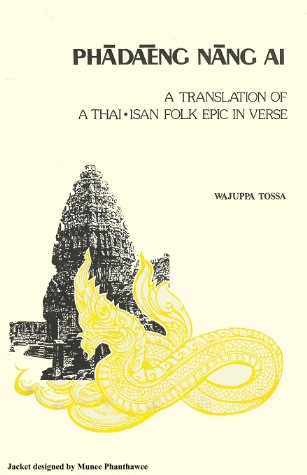Phadaeng Nang Ai (Please close this window, when finished.) Phadaeng Nang Ai is a tragic love triangle story of King Phadaeng, Princess Aikham, and the Naga Prince, Phangkhi. The story tells of Princess Aikham, the daughter of King Ek-Thita and Queen Sida of the ancient Khmer Empire. She fell in love with King Phadaeng of Phaphong city. Their secret love was never recognized as King Phadaeng failed to win the rocket contest in Bun Bangfai or the rocket festival organized by the Khmer king. At the same time, the Naga Prince Phangkhi was deeply in love with Princess Aikham without her knowledge. During the rocket festival, he came in disguise as a young man to take a glimpse at her beauty. Later, he came in disguise as a white squarrel wearing a bell to attract her attention. Seeing the squarrel, Aikham wished to have it as her pet, but she ordered the court hunter to shoot it for her with a poisoned arrow. (The storyteller told us that it was a fatal slip caused by Aikham and Phangkhi's karma in their past lives.) The squarrel died, but he made a wish that his meat be deliciously aromatic and plentiful for all to enjoy. So, Aikham shared the meat of the squarrel with everyone in her city, save for the widows as they had no husbands to work for the king's army. When the Naga King Suttho received the news of his son being killed by the Khmer hunter, he led the naga army to founder the entire everyone in the Khmer kingdom, particularly those who had eaten the squarrel meat. For those who did not eat the meat, the Naga King left them alone. Phadaeng heard about this disaster and came to rescue his lover, Princess Aikham, but in vain. The Naga King threw his tail to wrap the princess and pull her down to live in the Badan, the naga city. Phadaeng ended his life. He became the ghost king and organized a ghost army to fight for Aikham in Badan. The battle went on and on until Indra came to stop the fight and told everyone involved to wait for the next Buddha, Phra Si-aan, to judge as to whom she belonged. Most people would think that the Naga Prince Phangkhi had no right to Aikham as he came to the scene later than Phadaeng, but the storyteller related an episode of Phangkhi's karma in his past life as a mute. He was married to Aikham who was born as Amkha in her past life. However, in that life, the mute was married to Amkha only in name. He refused to have any intimate relationship with her. When he took her to see his parents in another village, he left her in a fig tree. Deserted in the middle of the forest, Amkham decided to drown herself in a river. But before doing so, she made a vow that the mute would repay for his abandoning her in his lives to come. She wished that he would meet the same fate in his lives to come. So, when the mute was born as the Naga Prince Phangkhi, Aikham ordered him shot by the hunter. Phangkhi died in a fig tree in Aikham's palace. In relating the past lives of Phangkhi and Aikham, the storyteller also recounted the story of Phangkhi's father, Suttho Naga King before he established his naga city in Badan underneath the Mekong River. Suttho Naga lived in Nongsae with his friend Suwan Naga. Later, they had a great fight becaue Suttho Naga became suspicious that his friend was not loyal to him. The battle went on until Indra, the great celestial being, sent Vissukamma to stop the war and to punish the two naga by sending them away to remake the courses of the river. Suwan Naga went to Nan River (situated in the present day northern Thailand). Suttho Naga went to the Mekong River and stayed at the city called Sattanakhanahut (the area of the Mekong River along the present day Nongkhai, Thailand and Vientiane, Laos). The entire folk epic is translated in English.* Here is an excerpts from Phadaeng Nang Ai : a Translation of a Thai-Isan Folk Epic in Verse, translated and edited by Wajuppa Tossa, Lewisburg, PA: Bucknell University Press,1990.
Glossary Notes: naga refers to Thai/Lao mythical serpent endowed with magical power; Mekong River is called Mae Nam Khong; mae means mother, nam means water, mae nam refers to river; nathi means river; khong means things; To Lao people, Mekong River means the river full of things.
|
